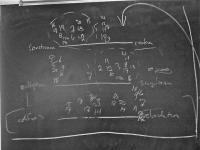
- home
- education
- science
- Minds-on Activities for Teaching Biology
- Next Generation Science Standards
- Remote Ready Biology Activities
- NGSS Biology Activities
- Hands-On Activities for Teaching Biology
- Teaching Climate Change
- Science Education
- Summer Institutes for K-12 Teachers 1995-2010
- Brain & Behavior
- Biology
- Science & Culture
- Complex Systems
- digital humanities
- play
- one world
 © Serendip® 1994 - All rights reserved. Privacy Policy
© Serendip® 1994 - All rights reserved. Privacy Policy

PhilSci - Week 1
Very rich conversation today, on multiple levels. Its nice to have empirical support for Micheal's philosophical argument that constructivism does not entail multiplism (Krausz, "Interpretation and its Objects: A Synoptic View"), that one can perfectly well be a constructivist and a singularist, as per student 16 in the image on the right (click on it for enlargement). Interesting too that we have more people with starting positions as constructivists than as realists, and a more bimodal distribution on the multiplism/singularism axis than on the constructivist/realist axis. And a bias towards elucidation as opposed to edification (Krausz, "Mapping Relativisms"). It looks to me like one's position along any of the three dimensions can be independent of position along the other two. It would be interesting to add some more dimensions (cultural individualist/collectivist? political indivdualist/collectivist?) and see what correlations do/do not show up. One needs though to be careful about the referent. In the three cases illustrated, the dimensions refer specifically to one's perspective on scientific inquiry. Things could quickly get quite complicated if one created dimensions that referred to other things, including others of the dimensions. In any case, it is nice to have this map as a record of starting place, one that we can refer to at the end of the semester to see what, if anything, has changed.
Interesting too that we have more people with starting positions as constructivists than as realists, and a more bimodal distribution on the multiplism/singularism axis than on the constructivist/realist axis. And a bias towards elucidation as opposed to edification (Krausz, "Mapping Relativisms"). It looks to me like one's position along any of the three dimensions can be independent of position along the other two. It would be interesting to add some more dimensions (cultural individualist/collectivist? political indivdualist/collectivist?) and see what correlations do/do not show up. One needs though to be careful about the referent. In the three cases illustrated, the dimensions refer specifically to one's perspective on scientific inquiry. Things could quickly get quite complicated if one created dimensions that referred to other things, including others of the dimensions. In any case, it is nice to have this map as a record of starting place, one that we can refer to at the end of the semester to see what, if anything, has changed.
Interesting issues raised as well about the demarcation problem, not unrelated to the question of an additional dimension related to culture/politics. Its an intriguing idea that the science/non-science distinction is actually not makeable solely on the grounds of "objectivity" but in instead also dependent on context, where context includes motivation and future impact. And that there are both assets and hazards in the replacement of "positivism" by "negativism", as well as in "univeralism". Maybe philosophy of science should move from a fundamentlaly descriptive activity to a more prescriptive one? And from a less insular position (primarily concerned with issues of ontology, epistemology, and logic) to a more encompassing one (involving intersections with esthetics and morality as well)? Along these lines, a recent book by George A. Reisch, How the Cold War Tranformed Philosophy of Science: To the Icy Slopes of Logic, is relevant. It suggests that a broader conception of science existed earlier in the last century and was vitiated by social/political forces. A related but historically earlier argument about pragmatism is hinted at in Louis Menand's The Metaphysical Club.
Lots of initial grist for the mill. Looking forward to hearing what other people heard/saw in our first conversation, and where we can with it all during the semester.